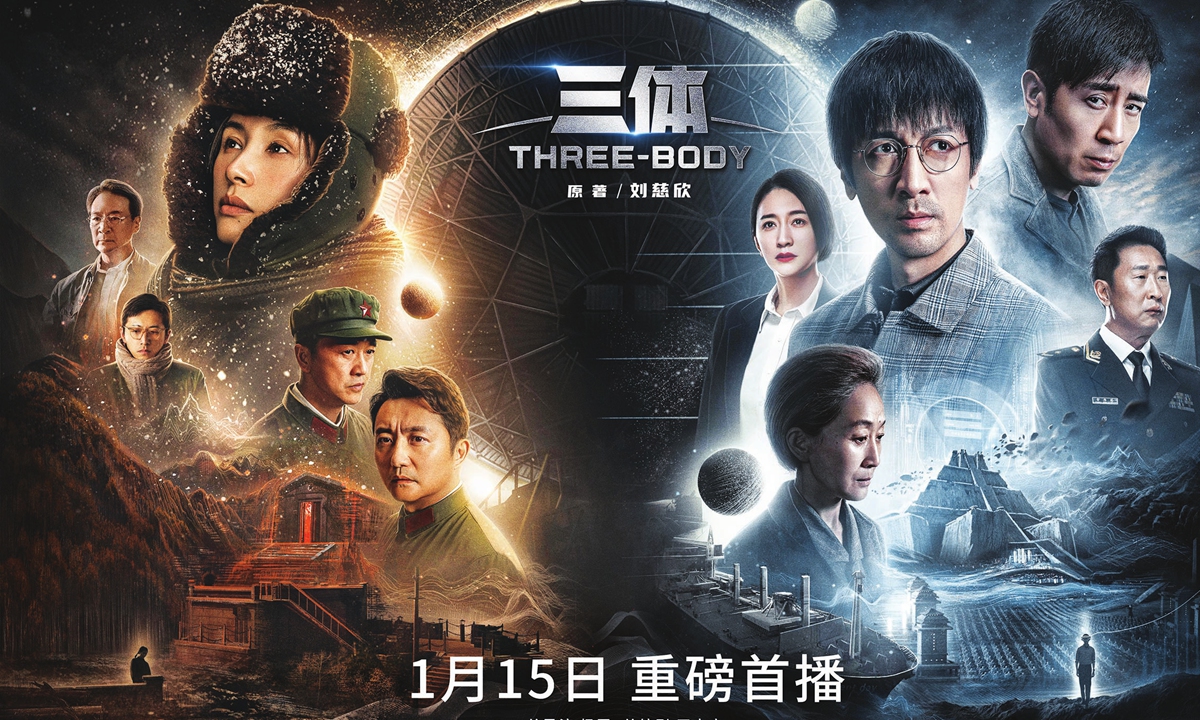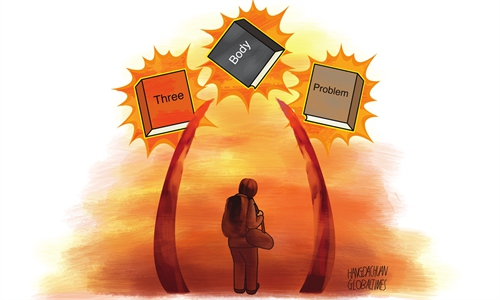ARTS / TV
‘Three-Body Problem’ craze reflects unique Chinese heroism values, unconstrained imagination
A sci-fi romance

Promotional material for Three-Body Photo: Courtesy of Tencent Video
Three-Body, the Chinese TV adaptation of Liu Cixin's Hugo Award-winning sci-fi novel The Three-Body Problem, debuted on Chinese Central Television 8 and Tencent Video during prime time on Sunday night.
The hashtag for the 30-episode series had earned more than 130 million views on China's Twitter-like Sina Weibo as of Sunday. Many Chinese netizens commented that the story was largely faithful to the original work.
Benchmark production
Shi Wenxue, a cultural critic based in Beijing, told the Global Times on Sunday that looking at the current viewership data on Tencent Video and the heated discussion on Chinese social media, the Three-Body TV series is sure to be a hit.
"The Three-Body TV series will be like the movie The Wandering Earth, becoming a benchmark for sci-fi TV series that forces filmmakers to continue to climb to higher peaks," he said.
The Wandering Earth, currently the fifth highest-grossing film in China, is also an adaptation of a short story from the Hugo Award-winning author.
Shi pointed out that under the influence of The Three-Body Problem, more and more sci-fi related film and TV series have been released in recent years, with several of them gaining critical praise.
With China's increasingly comprehensive national strength, especially in science and technology, China will have more fantastic sci-fi works besides The Wandering Earth and Three-Body Problem, Shang Yu, deputy director of the Yunnan People's Publishing House, told the Global Times on Sunday.
Heroes for all
From books to animated series airing on China's popular video sharing platform Bilibili to the new live-action TV drama, as well as an upcoming English adaptation produced by Netflix, the wide influence of the Three-body Problem IP has spread to the entire world. Cultural critics told the Global Times that the craze reflects the unique heroism of the Chinese people, human's strong desire to explore the unknown universe and concern for the future of mankind.
Yu Jinlong, a cultural critic based in Beijing, told the Global Times on Sunday that the work's huge success is based on the background of China's brilliant achievements in the aerospace industry and that it portrays China's specific type of heroism. "People in the West worship heroes, but this kind of heroism is more individual, while Chinese heroism strives for honor for the collective." He pointed out the heroes in Liu's science fiction novels are national heroes who sacrifice their lives to defend their homes and the country as well as individual heroes whose heroism lies in the individual's unyielding struggle against the unfair fate, the unremitting pursuit of truth and constant self-transcendence. But they all serve the collective - the development of human beings.
The unique story setting and values in the book can be another reason for its success. According to Yu, Liu describes a new form of community that transcends the nation and includes all mankind, or "a community with shared future for mankind." Four hundred years after the invasion of the Trisolaran civilization, the fate of all people are linked together. People's concept of time and vision of civilization have undergone major changes. The barriers between nations and countries have gradually broken down, and finally lead to a unified federal government. Ma Yongqiang, co-president of the Duzhe Publishing House, told the Global Times on Sunday that the reason that The Three-Body Problem has gained global attention is because the work itself is the epitome of the development of human beings.
"The Three-Body Problem does not deliberately emphasize national borders and races, because in the face of the survival of the human race, these issues seem pale and naive. The increasingly serious situation of global warming is the same essential threat to human society as the aliens in the book. Such a work that can resonate with all mankind surly will be liked by the whole world."
Compared with the universe described in other sci-fi novels, the universe described by Liu is dark, realistic and absolutely rational. He reveals the limitations of the Earth and human beings, which can be seen in the character Zhang Beihai, who pioneers one of the first Starship Earths and tries to evade the alien civilization to preserve hopes for the future of humanity.
After realizing humans' weakness, the characters in the book continue to reform and innovate step by step in the "dark forest" surrounded by powerful enemies. This shows Chinese people's pursuit of invigorating through science and education, and the core driving force for the development of all mankind, said Ma.


